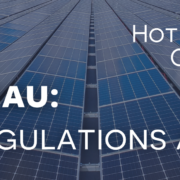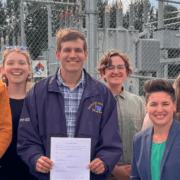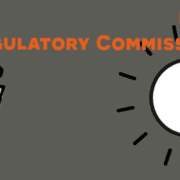Is it just us, or does spring feel extra busy this year? In a week with multiple elections closing, we hope you are celebrating Suzanne LaFrance’s significant lead in the Mayoral runoff and plan on joining us Friday for the Chugach Electric Annual Meeting! – we also watched closely as the 2024 Alaska state legislative session came to a close.
During the final few days of the session, we saw many of our clean energy and climate priorities across the finish line. We’ll have more to come on what this means for our next steps, but for now, we’re excited to share this brief recap.
PASSED! Community Solar (SAVE Act)
The Alaska Center has worked closely with Alaska Public Interest Research Group outwardly and behind the scenes over the past year to move a community solar bill forward. The goal of the legislation is to allow more people to access clean energy, by subscribing to solar arrays or other clean energy generation that is centrally located rather than placed on individual properties. We informed the public about community energy, testified ourselves, and encouraged supporters to call or write in to provide testimony, and met with legislators to answer specific questions and concerns about community energy programs. The bill went through many iterations and ultimately became known as the SAVE Act (Saving Alaskans money with Voluntary community Energy).
In late April, the SAVE Act passed the Senate unanimously, with Senators from various parties and districts speaking in favor of the legislation on the floor. We celebrated but knew we had to keep working to get the word out about the bill and clarify any concerns raised on the House side. Finally, this week, the bill passed the House and will head to Governor Dunleavy’s desk for his signature.
We are so excited to see community energy programs launch in Alaska and view this as one step toward a more equitable energy future.
PASSED! Green Bank
Late Wednesday night, before gaveling out for the year, the legislature passed a bill with language to create a Green Bank. A Green Bank is a financial entity that leverages private financing and invests in renewable energy technology like heat pumps, electric vehicle charging stations, and more critical new infrastructure that a traditional financial institution is less likely to finance. The bill states that the entity “serves a public purpose benefitting the people of the state” by financing sustainable energy development.
Alaska’s Green Bank will be housed under the Alaska Housing Finance Corporation, a community-oriented agency, that will strive to invest in renewables in a way that best serves the people of Alaska. We look forward to finding opportunities to collaborate with the Green Bank to ensure a transparent and just process.
STILL WORK TO BE DONE! Renewable Portfolio Standard (RPS)
Although multiple versions of renewable or clean energy standards were introduced this session, they ultimately did not move forward. Utility providers themselves were heavily involved in the conversation, as both Golden Valley Electric Association (GVEA) and Chugach Electric Association (CEA) took up the issue in their own Board meetings. CEA passed a formal resolution in support of a general RPS, but raised issues with the specifics of the legislative proposals. Utility providers generally expressed concerns about the grid’s transmission capacity and limitations, the exact percentages included in proposals, and the enforcement mechanisms associated with standards.
Grid transmission capacity ultimately became a major focus of the session (more on that below). In terms of enforcement, we spoke with partners about alternatives to fines or penalties, which utilities said risked raising rates for consumers. One option is to provide significant incentives for meeting goals. Either way, we believe it will only be possible to actually meet these goals if there is some related consequence for achieving them or failing to do so.
The Alaska Center will continue to advocate for a state standard to be set to ensure we are on track to reduce our overall carbon output.
PASSED! Railbelt Transmission
We wrote to you last month to update you on the shift to transmission that took place in the energy space this year. With various bills and conflicting views on the most efficient way forward, this was a complex legislative issue. We weighed in by providing testimony and written analysis throughout the process, as well as meeting directly with legislators about the various transmission issues being addressed.
First, $30 million was included in the budget as the first phase of a state match for GRIP (Grid Resilience and Innovation Partnerships) funding. This federal grant of $206 million requires a state match, and will be used to upgrade elements of our transmission system, which is key to our ability to send renewable energy from wherever it is generated to wherever the power is needed at that moment.
The final transmission legislation got rid of duplicative charges to reduce the overall costs of sending energy up and down the railbelt, updated requirements for commissioners to serve on the Regulatory Commission of Alaska, and addressed the taxation of new power projects. It also created a new organization under the Alaska Energy Authority called a railbelt transmission organization (RTO) but left planning in the hands of the existing Railbelt Reliability Council. Instead, this RTO will focus on cost recovery of transmission operations.
An efficient and upgraded transmission system is a critical part of our clean energy infrastructure, and we look forward to thinking about the next steps in the coming year.
STILL WORK TO BE DONE! Voting Rights
Voting rights were a hot topic this session and both the House and the Senate attempted to pass substantial updates to our current systems and policies. HB 4 (the repeal of open primaries and ranked choice voting (RCV)) had a hearing on day one of the session, and HB 129 (purging voter rolls), moved quickly out of the House and into the Senate for consideration. The Senate then turned HB 129 from a bad voting rights bill into a good voting rights bill by adding a provision to remove the witness signature requirement on mail-in ballots, adding a system to fix mistakes on ballots, and allowing Alaskans to register to vote on election day.
Unfortunately, the House would not support these provisions and this bill did not make it over the finish line. What does this mean for voting rights? It means that many of our leaders and community members want to see voting rights expanded, and that next year we will work even harder to pass positive voting reforms. The repeal of ranked-choice voting and open primaries will likely be on the ballot this November, so we will continue to update you on how you can take action to protect our democracy.
PASSED! Juneteenth Bill
Finally, at 11:05pm the House voted to pass SB 22 – establishing Juneteenth Day as a legal holiday. Juneteenth is a crucial recognition of our shared history, emphasizing the central role of Black leaders. Specifically in Alaska, many of those leaders were brought up to build both the physical and the political infrastructure of this state, moving Alaska toward statehood. By officially recognizing Juneteenth, we honor the labor and sacrifice Black communities contribute and we join the rest of the nation in one day of celebration and liberation. Thanks to our leaders and community members for helping this get across the finish line! If you are in Anchorage, stop by and say hi at our booth at the Anchorage Juneteenth Celebrations on June 15 and 16!
We are grateful to the many elected officials who worked hard this session to move forward highly technical, politically charged, and crucial bills for our climate and our communities. We are looking forward to a summer full of advocacy to prepare for what the next session has in store for us! Stay tuned!
Powering forward together,
The Alaska Center










